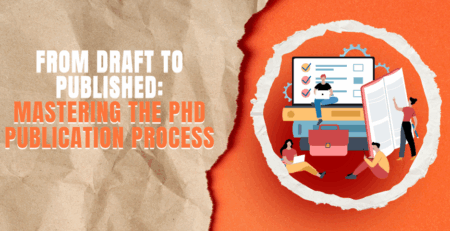Ace Your PhD With Ease: Manage Stress For A Smooth Sail
Kenfra Research - Shallo2025-03-28T15:00:22+05:30A PhD journey is both exhilarating and exhausting. The pursuit of knowledge, coupled with research pressure and deadlines, can often lead to overwhelming stress. However, managing stress effectively can make Your PhD With Ease smoother and more productive. In this blog, we will explore practical strategies to help you navigate the challenges of Your PhD With Ease.

Understanding PhD Stress
PhD stress stems from multiple factors, including:
- Research workload and deadlines
- Pressure to publish in high-impact journals
- Financial constraints
- Work-life balance struggles
- Isolation and lack of social engagement
Recognizing these stressors is the first step in effectively managing them. Once you understand what triggers your stress, you can take proactive steps to handle it better.
Effective Stress Management Strategies
Time Management is Key
Proper time management is one of the most effective ways to reduce stress. Prioritize tasks by setting realistic goals and breaking them into manageable chunks. Utilize productivity tools like Trello, Notion, or Asana to organize your research work efficiently. The Pomodoro technique—working in focused intervals with breaks—can also help maintain productivity without feeling overwhelmed.
Set Clear Boundaries
Many PhD students struggle with setting boundaries, which leads to burnout. Define specific working hours and adhere to them. Taking regular breaks and setting aside time for relaxation and personal activities can improve efficiency and prevent exhaustion. Remember, working longer hours does not always equate to greater productivity.
Stay Physically Active
Physical health directly impacts mental well-being. Engaging in regular exercise, such as yoga, jogging, or even simple stretching, can significantly reduce stress levels. Exercise releases endorphins, which help improve mood and cognitive function. Consider scheduling short workout sessions in your daily routine to stay active and refreshed.
Develop a Strong Support System
The PhD journey can be isolating, which is why building a strong support system is essential. Engage with fellow researchers, mentors, and friends. Join academic forums or PhD support groups to share experiences and gain motivation. Peer discussions can provide emotional support, fresh perspectives, and valuable insights on overcoming research challenges.
Mindfulness & Relaxation Techniques
Incorporating mindfulness techniques into your daily routine can significantly improve mental clarity and reduce stress. Practices such as meditation, deep breathing exercises, and journaling help in processing emotions and staying grounded. Even spending a few minutes each day on mindfulness can make a noticeable difference in how you handle stress.
Seek Professional Help if Needed
Sometimes, stress and anxiety can become overwhelming despite your best efforts. If you experience prolonged stress, depression, or anxiety, do not hesitate to seek professional counseling or therapy. Many universities offer free or subsidized mental health resources for PhD scholars. Speaking with a counselor can help you develop effective coping mechanisms tailored to your personal needs.
The Role of Kenfra Research in Reducing PhD Stress
At Kenfra Research, we understand the challenges PhD scholars face. Our expert services, including PhD topic selection, plagiarism checking, and publication assistance, ensure a hassle-free research journey. We provide personalized guidance and support to help you stay focused on innovation while we handle the complexities of research compliance.
Whether you need assistance with research methodology, literature review, or journal publication, our dedicated experts can streamline your PhD process, reducing stress and increasing efficiency. By partnering with us, you gain access to reliable academic support that keeps your research on track and minimizes unnecessary pressure.
Additional Tips to Maintain Mental Well-being
- Maintain a Healthy Diet: Eating nutritious foods supports brain function and overall well-being.
- Get Adequate Sleep: Lack of sleep can increase stress and decrease cognitive performance.
- Take Short Breaks: Step away from your desk periodically to refresh your mind.
- Engage in Hobbies: Pursuing a hobby can serve as a great stress reliever.
- Stay Positive: Focus on progress rather than perfection. Celebrate small achievements along the way.
Conclusion
Managing stress during a PhD is crucial for both academic success and personal well-being. By implementing these strategies, you can enhance productivity, maintain mental health, and enjoy Your PhD With Ease. Remember, Your PhD With Ease is a marathon, not a sprint—pace yourself wisely!
Kenfra Research understands the challenges faced by PhD scholars and offers tailored solutions to support your academic goals. From topic selection to advanced plagiarism checking.









Leave a Reply